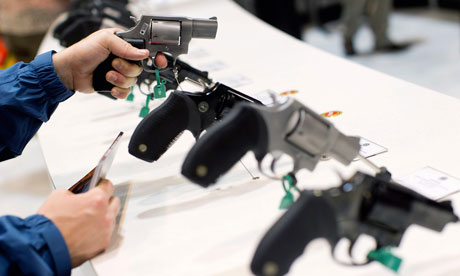When will the US learn from Australia? Stricter gun control laws save lives
After our own mass murder, Australia didn't ban guns, but we passed stronger regulations. Gun deaths dropped dramatically

Rebecca Peters
theguardian.com
 |
Following the passage
of stricter laws,
Australian gun deaths have dropped by two-thirds.
Photograph: Whitney Curtis/Getty Images
|
The mass murder in Newtown Connecticut a year ago caused shock and sorrow all around the world. In Australia
it also revived memories of our own horror on a similar scale, when
dozens of people innocently going about their day were gunned down by a
disturbed young man.
Our tragedy occurred in 1996 at the Port Arthur historic site in Tasmania, one of Australia's most popular tourist destinations. The dead numbered 35, with more than 20 others injured. The victims ranged in age from 3 to 72. They included children, teens, adults and seniors; tourists and local workers; several couples, a pair of brothers, a mother and her two little daughters, and members of a retirees' club on an outing.
This was not the first shooting massacre we had suffered, but it was the largest in living memory. The tragedy ignited an explosion of public outrage, soul-searching and demands for better regulation of guns. We changed our laws. As a result, gun deaths in Australia have dropped by two-thirds, and we have never had another mass shooting.
Every country is unique, but Australia is more similar to the US than is, say, Japan or England. We have a frontier history and a strong gun culture. Each state and territory has its own gun laws, and in 1996 these varied widely between the jurisdictions. At that time Australia's firearm mortality rate per population was 2.6/100,000 – about one-quarter the US rate (pdf), according to data from the Australian Bureau of Statistics and the US Center for Disease Control. Today the rate is under 1/100,000 – less than one-tenth the US rate (pdf). Those figures refer to all gun deaths – homicide, suicide and unintentional. If we focus on gun homicide rates, the US outstrips Australia 30-fold.
The 1996 reforms made gun laws stronger and uniform across Australia. Semi-automatic rifles were prohibited (with narrow exceptions), and the world's biggest buyback saw nearly 700,000 guns removed from circulation and destroyed. The licensing and registration systems of all states and territories were harmonised and linked, so that a person barred from owning guns in one state can no longer acquire them in another. All gun sales are subject to screening (universal background checks), which means you cannot buy a gun over the internet or at a garage sale.
Gun ownership requires a license, and every sale is subject to a 28-day waiting period. The licensing process considers not only the applicant's age and criminal convictions, but also a range of other factors relevant to possession of a product that is (a) designed for killing and (b) highly coveted by people who should not have it. Relevant factors include the applicant's living circumstances, mental and physical health, restraining orders or other encounters with the law, type of gun desired and for what purpose, safety training, storage arrangements, and the public interest.
Police make whatever inquiries they think necessary to inform the decision on whether (or under what conditions) the license should be granted. This can include checking with neighbourhood police, the family doctor and especially spouses or partners. There are many red flags that do not appear in an automated computer record of criminal convictions: substance abuse, mental instability, conflict at home or at work, to name a few. Another risk factor is whether granting the license might make guns accessible to another household member whose own circumstances would disqualify them from a license – for example, a depressed teenager or a person with criminal convictions.
The screening process serves to block dangerous or irresponsible candidates, but also underscores for applicants and their families that bringing home a gun is a serious decision which affects the entire household, and indeed the entire community. Many applicants abandon their request during the waiting period – dissuaded by family members, or simply because the momentary enthusiasm for gun ownership passes.
Australia also requires a justifiable reason for the type of weapon the applicant wants to own. If you say you plan to hunt rabbits, your license doesn't allow you to a high-powered rifle. And if you already have a couple of guns suitable for hunting rabbits, it becomes increasingly difficult to justify acquiring more. This is a measure against the accumulation of private arsenals. A significant legal and cultural difference between our two countries: Australia doesn't accept anticipation of killing another person (self-defence) as a reason for owning a gun. To qualify for a handgun license, you must belong to and regularly attend a target shooting club.
An important feature of a licence is that it must be renewed every few years, and it can be cancelled or suspended if the bearer no longer meets the standard required – for example, due to domestic violence, a dangerous mental condition.
Australia didn't ban guns. Hunting and shooting are still thriving. But by adopting laws that give priority to public safety, we have saved thousands of lives.
Our tragedy occurred in 1996 at the Port Arthur historic site in Tasmania, one of Australia's most popular tourist destinations. The dead numbered 35, with more than 20 others injured. The victims ranged in age from 3 to 72. They included children, teens, adults and seniors; tourists and local workers; several couples, a pair of brothers, a mother and her two little daughters, and members of a retirees' club on an outing.
This was not the first shooting massacre we had suffered, but it was the largest in living memory. The tragedy ignited an explosion of public outrage, soul-searching and demands for better regulation of guns. We changed our laws. As a result, gun deaths in Australia have dropped by two-thirds, and we have never had another mass shooting.
Every country is unique, but Australia is more similar to the US than is, say, Japan or England. We have a frontier history and a strong gun culture. Each state and territory has its own gun laws, and in 1996 these varied widely between the jurisdictions. At that time Australia's firearm mortality rate per population was 2.6/100,000 – about one-quarter the US rate (pdf), according to data from the Australian Bureau of Statistics and the US Center for Disease Control. Today the rate is under 1/100,000 – less than one-tenth the US rate (pdf). Those figures refer to all gun deaths – homicide, suicide and unintentional. If we focus on gun homicide rates, the US outstrips Australia 30-fold.
The 1996 reforms made gun laws stronger and uniform across Australia. Semi-automatic rifles were prohibited (with narrow exceptions), and the world's biggest buyback saw nearly 700,000 guns removed from circulation and destroyed. The licensing and registration systems of all states and territories were harmonised and linked, so that a person barred from owning guns in one state can no longer acquire them in another. All gun sales are subject to screening (universal background checks), which means you cannot buy a gun over the internet or at a garage sale.
Gun ownership requires a license, and every sale is subject to a 28-day waiting period. The licensing process considers not only the applicant's age and criminal convictions, but also a range of other factors relevant to possession of a product that is (a) designed for killing and (b) highly coveted by people who should not have it. Relevant factors include the applicant's living circumstances, mental and physical health, restraining orders or other encounters with the law, type of gun desired and for what purpose, safety training, storage arrangements, and the public interest.
Police make whatever inquiries they think necessary to inform the decision on whether (or under what conditions) the license should be granted. This can include checking with neighbourhood police, the family doctor and especially spouses or partners. There are many red flags that do not appear in an automated computer record of criminal convictions: substance abuse, mental instability, conflict at home or at work, to name a few. Another risk factor is whether granting the license might make guns accessible to another household member whose own circumstances would disqualify them from a license – for example, a depressed teenager or a person with criminal convictions.
The screening process serves to block dangerous or irresponsible candidates, but also underscores for applicants and their families that bringing home a gun is a serious decision which affects the entire household, and indeed the entire community. Many applicants abandon their request during the waiting period – dissuaded by family members, or simply because the momentary enthusiasm for gun ownership passes.
Australia also requires a justifiable reason for the type of weapon the applicant wants to own. If you say you plan to hunt rabbits, your license doesn't allow you to a high-powered rifle. And if you already have a couple of guns suitable for hunting rabbits, it becomes increasingly difficult to justify acquiring more. This is a measure against the accumulation of private arsenals. A significant legal and cultural difference between our two countries: Australia doesn't accept anticipation of killing another person (self-defence) as a reason for owning a gun. To qualify for a handgun license, you must belong to and regularly attend a target shooting club.
An important feature of a licence is that it must be renewed every few years, and it can be cancelled or suspended if the bearer no longer meets the standard required – for example, due to domestic violence, a dangerous mental condition.
Australia didn't ban guns. Hunting and shooting are still thriving. But by adopting laws that give priority to public safety, we have saved thousands of lives.

No comments:
Post a Comment